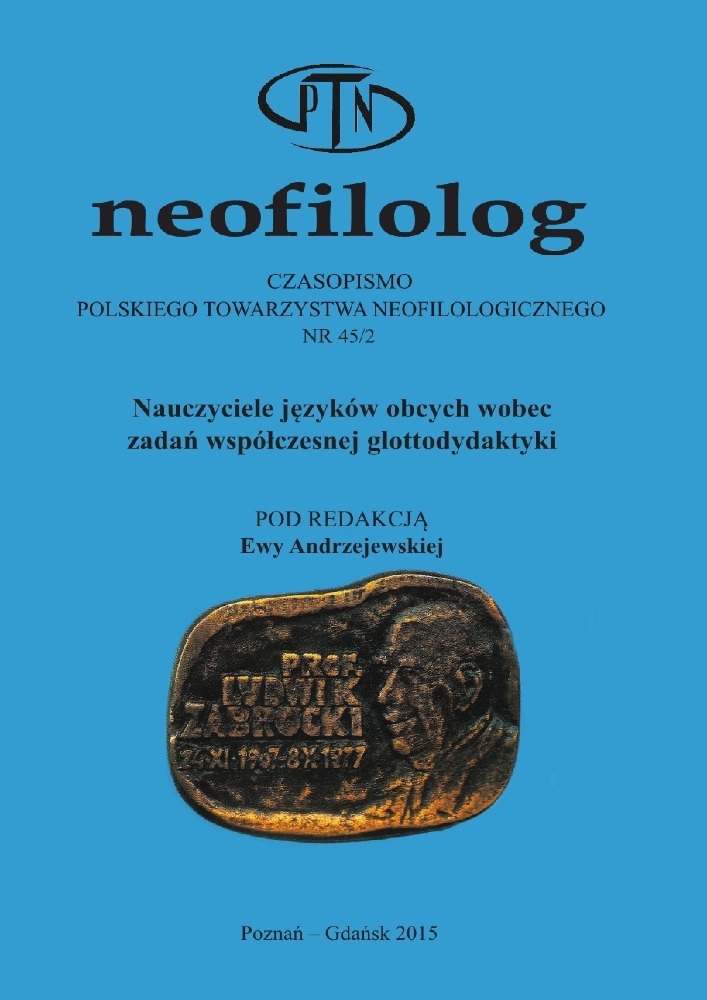Résumé
The article discusses the problems concerning vocabulary introduced insome popular contemporary coursebooks for Polish language teaching.
What can be sometimes found in them are words and expressions not
suiting the language level of the course, some of them rare, specialized,
obsolete, marked in a characteristic way, regional. It also happens that
words are used improperly in the context or they are consolidated in
unnatural linguistic contexts. Also some problems with proper names
appear – they sometimes have a confusing form or, with no good reason,
they are very difficult to pronounce. The situation is partly the result of
the authors’ efforts made to simplify grammar or introduce humorous
atmosphere during the lesson. In the conclusion the author suggests paying
more attention to the choice of vocabulary units to be taught.
Références
Bańko, M. (red.). 2000. Inny słownik języka polskiego PWN. T. 1-2. Warszawa: Wydawnictwo Naukowe PWN.
Bańko, M., Krajewska, M. 1994. Słownik wyrazów kłopotliwych. Warszawa: Wydawnictwo Naukowe PWN.
Dembińska, K., Małyska, A. 2010. Start 1. Survival Polish. Podręcznik do nauki języka polskiego na poziomie A0. Warszawa: Klub Dialogu S.C.
Doroszewski, W. (red.). 1980. Słownik poprawnej polszczyzny PWN. Warszawa: Państwowe Wydawnictwo Naukowe.
Dubisz, S. (red.). 2008. Uniwersalny słownik języka polskiego. T. 1-4. Warszawa: Wy-dawnictwo Naukowe PWN.
Gałyga, D. 2011. Jak to łatwo powiedzieć… Ćwiczenia komunikacyjne dla początkujących. Kraków: Towarzystwo Autorów i Wydawców Prac Naukowych Universitas.
Janowska, A., Pastuchowa, M. 2008. Dzień dobry! Podręcznik do nauki języka polskie-go dla początkujących. Tarnów: Tarnowska Fundacja Kultury.
Małolepsza, M., Szymkiewicz, A. 2006. Hurra!!! Po polsku 1. Podręcznik studenta. Kraków: PROLOG Szkoła Języków Obcych.
Markowski, A. (red.). 1999. Nowy słownik poprawnej polszczyzny PWN. Warszawa: Wydawnictwo Naukowe PWN.
Seretny, A., Lipińska, E. 2005. ABC metodyki nauczania języka polskiego jako obcego. Kraków: Universitas.
Tabakowska, E. (red. ). 2001. Kognitywne podstawy języka i językoznawstwa. Kraków: Towarzystwo Autorów i Wydawców Prac Naukowych Universitas.
http://ogloszenia.trojmiasto.pl DW 05.09.2014.
http://www.ogloszenia.krakow.pl DW 06.09.2014.
Licence
© Ewa Badyda 2019

Ce travail est disponible sous licence Creative Commons Attribution - Pas de Modification 4.0 International.
Auteurs :
Les auteurs de textes acceptés pour publication dans la revue Neofilolog sont tenus de remplir, signer et renvoyer à l'adresse de la rédaction, un accord sur l'octroi d'une licence gratuite pour les œuvres, avec obligation d'accorder une sous-licence CC.
En vertu de cet accord, les auteurs des textes publiés dans la revue Neofilolog accordent à l'Université Adam Mickiewicz de Poznań une licence non exclusive et gratuite et permettent l'utilisation de la sous-licence Creative Commons Attribution-NoDerivatives 4.0 International (CC BY-ND 4.0).
Les auteurs se réservent le droit de disposer librement de l'œuvre.
Utilisateurs :
Les utilisateurs d'Internet intéressés ont le droit d'utiliser les œuvres publiées à partir de l'année 2017 sous réserve des conditions suivantes :
- reconnaissance de la qualité d'auteur - l'obligation de fournir des informations sur la qualité d'auteur, le titre, la source (liens vers l'œuvre originale, DOI) et la licence, ainsi que l'œuvre distribuée ;
- sans créer d'œuvres dérivées - l'œuvre doit être conservée dans sa forme originale, p. ex. les traductions ou les interprétations ne peuvent être distribuées sans le consentement de l'auteur.
Tous les textes publiés sont soumis au droit d'auteur.
Autres :
L'Université Adam Mickiewicz de Poznań se réserve le droit à la revue dans son ensemble (mise en page, forme graphique, titre, conception de la couverture, logo, etc.).
.
